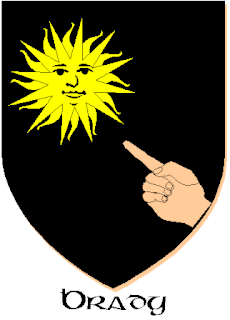 W
WBrady is a surname derived from the Irish surname Ó Brádaigh or Mac Brádaigh, meaning "spirited; broad".
 W
WBrophy is an Irish surname of ancient origin, which is derived from the Irish "Uí Bhróithe" or "Ó Bróithe" septs that were located mostly around Ballybrophy, Laois, and in counties Carlow and Kilkenny. The family has been prominent in the history of Ireland for nearly 1000 years and has included petty kings (Rí), clerics, soldiers, and writers. The family was first mentioned in the late 11th century, but as a member of the Dál Birn dynasty, its semi-legendary genealogy stretches back to AD 200 according to the Bodleian Library, MS Rawlinson B 502. As such, it remains one of Ireland's oldest extant pre-Norman Conquest noble families.
 W
WO'Dwyer, also known as Dwyer, Dwyre or Dyer is one of Ireland’s oldest Gaelic noble or aristocratic houses, based most prominently in what is today County Tipperary. The name means "dark coloured", in reference to their progenitor Dubhuir mac Spealáin's hair colour.
 W
WConley is a surname of Irish origin. It is a variant spelling of several more common names like Conly, Connelly, and Connolly. "Conly" is listed in the census of 1659 as coming from the city of Dublin. "O′Connoly" was a principal name of Monaghan in 1679. 1911 60 people with the surname Conley are listed in the digitised census records of Ireland.
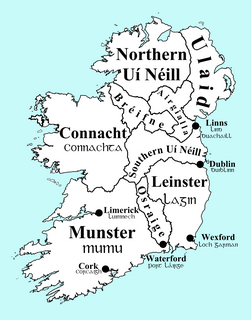 W
WDevaney, Devany, and O'Devaney, is a surname derived from the Irish Ó/Mac Duibheamhna, meaning "descendants/son of Dubheamhna". They are cited by O'Dugan as being chiefs of Kinelawley in the over-kingdom of Ulaid, now known as Clanawley in present-day County Down, Northern Ireland.
 W
WDillon is an Irish surname of Breton origin, descending from a cadet branch of Viscomte de Leon in Northern Brittany. It first appeared in Ireland with the arrival of Sir Henry de Leon, Prince John's secretary in 1185. Sir Henry married Maud de Courcy, daughter of Sir John de Courcy and Affrica Guðrøðardóttir. Awarded large tracts of land by in Meath and Westmeath, one of the Dillons’ first Mott & Baileys can still be found at Dunnamona before the establishment of stone structures such as Portlick Castle.
 W
WDonegan, most commonly refers to a Gaelic Irish clan from Munster. The name is diminutive of Donn which means, "the Dark One", or in modern Irish, "brown", referring to hair colour. The most prominent dynasty were an Érainn people of the Múscraige and provided a King of Munster in the 10th century in the form of Flaithbertach mac Inmainén. Much later, the family provided the Dungan Baronets and two Earls of Limerick, the most notable of which Thomas Dongan, 2nd Earl of Limerick was a Governor of New York.
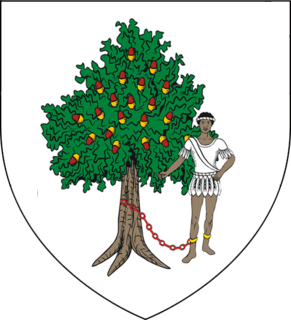 W
WDonnellan is an Irish surname and refers to the clan name Ó Domhnalláin or O'Donnellan.
 W
WDowney is an Irish surname that means in English “belonging to a fort”. The name is found from ancient times in areas of Ireland's modern County Galway, southwest Cork, Kerry, Limerick, Ulster and Leinster and is believed to be the surname of three distinct families. In Ulster, Downey were the chiefs of the Ulaid petty-kingdom of Cinel Amhalgaidh, now known in the Anglicised form as Clanawley in County Down, Northern Ireland.
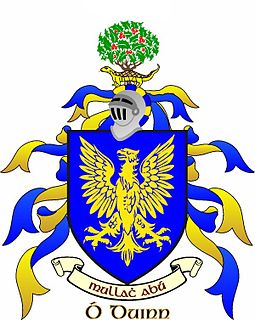 W
WDunne is an Irish surname, derived from the Irish Ó Duinn and Ó Doinn, meaning "dark" or "brown." The name Dunne in Ireland is derived from the Ó Duinn and the Ó Doinn Gaelic septs who were based in County Laois, County Meath and County Wicklow. These septs in turn are descendants of the O'Regan noble family. It is in these counties that the majority of descendants can still be found. Hundreds of years ago, the Gaelic name used by the Dunn family in Ireland was Ó Duinn or Ó Doinn. Both Gaelic names are derived from the Gaelic word donn, which means "brown". Ó Doinn is the genitive case of donn. First found in county Meath, where they held a family seat from very ancient times. Variations: Dunn, Dunne, Dun, Duen, O'Dunne, O'Doyne, Doine, Doin, O'Dunn.
 W
WGallagher is an Irish Gaelic clan based most prominently in what is today County Donegal. The clan name originated in the 10th century as a derivative of its founder Gallchobhair mac Rorcan. They descend in the paternal line from the Northern Uí Néill's Cenél Conaill. The immediate progenitors of the Gallaghers held the High Kingship of Ireland during the 6th and 7th centuries in the form of Ainmuire mac Sétnai, Áed mac Ainmuirech, Máel Coba mac Áedo and Cellach mac Máele Coba; Áed was also an ancestor of the O'Donnell and O'Doherty clans. Indeed, during the Middle Ages, the Gallaghers were Marshals of the Kingdom of Tyrconnell, ruled by their previously junior kinsmen the O'Donnells.
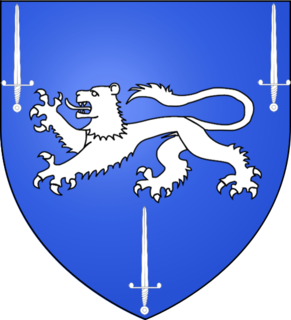 W
WMacGorman, also known as McGorman, Gorman, or O'Gorman, is an Irish Gaelic clan based most prominently in what is today County Clare. The paternal ancestors of the clan are of the Laigin and emerged in what is today County Waterford. As leaders of the Uí Bairrche, they competed with the Uí Cheinnselaig in the 5th century for the Kingship of Leinster, ultimately losing out in that specific arena, but holding on to significant lands in the Leinster area.
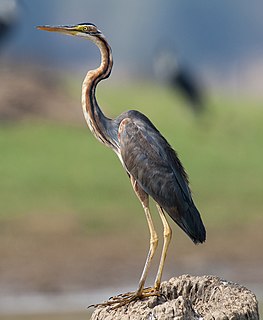 W
WHeron is a surname originating in the British Isles and Normandy during the Middle Ages.
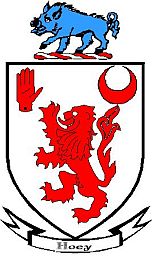 W
WHoey is an Irish surname. Spelling variations include: O'Hoey, Haughey, McCaughey and McKeogh, among others. The original Irish spelling is Ó hEochaidh.
 W
WKelly is a surname in the English language. The name has numerous origins, most notably from the Ui Maine. In some cases it is derived from toponyms located in Ireland and Great Britain, in other cases it is derived from patronyms in the Irish language.
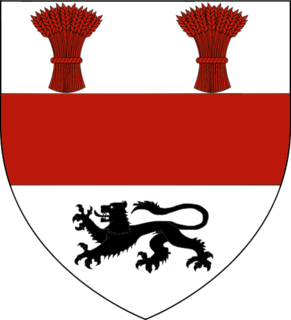 W
WKinsella is a surname of Gaelic, i.e. Irish, origin, developed from the original form Cinnsealach, meaning "proud". The Kinsella sept is native in part of the modern County Wexford in Leinster, a district formerly called the Kinsellaghs. The oldest documentary mention of the surname appears in the "Ancient Records of Leinster", dated to 1170, where the son of the King of Leinster is named as Enna Cinsealach. Originally pronounced "KIN səl la", it is also often found pronounced "kən SEL lə".
 W
WThe name Lennon can refer to one of several individuals or groups:
 W
WMacCarthy, also spelled Macarthy, McCarthy or McCarty, is an Irish clan originating from Munster, an area they ruled during the Middle Ages. It was divided into several great branches; the MacCarthy Reagh, MacCarthy of Muskerry, and MacCarthy of Duhallow dynasties were the three most important of these.
 W
WMac Conmara is an Irish surname of a family of County Clare in Ireland. The McNamara family were a Dál gCais sept and after the O'Briens one of the most powerful families in the Kingdom of Thomond as Lords of Clancullen. They are related to the O'Gradys, also descended from the Uí Caisin line of the Dál gCais.
 W
WMaguire is an Irish surname from the Irish language Mag Uidhir, which is "son of Odhar" or "son of the dun or dark coloured one". According to legend, the eleventh in descent from Colla da Chrich, great-grandson of Cormac mac Airt, monarch of Ireland about the middle of the third century. From the 13th to the 17th centuries, the Maguires were kings of Fermanagh.
 W
WThe surnames McCabe and MacCabe are Irish and Scottish surnames. They are Anglicisations of the Gaelic Mac Cába, a patronymic name meaning "son of Cába". The nickname or personal name Cába is of uncertain origin. The surname can be written in modern Scottish Gaelic as MacCàba and MacCaibe. Patrick Woulfe considered that the surname was possibly derived from a nickname, meaning "a cap", or "hood". Henry Harrison suggested the name was from the Gaelic Mac Aba, meaning "son of the Abbot". If Harrison is to be believed then the surname would have a similar etymology as the surnames MacNab, McNab, which are from the Gaelic Mac an Aba, Mac an Abadh.
 W
WMcCaughey is an Irish surname. Spelling variations include: McHaughey, MacCaughey, McGaughey and O'Coffey, among others. Modern spelling comes from the original Mac hEochaidh.
 W
WThe surname McDonagh, is of Irish origin also spelled MacDonagh is from the Irish language Mac Dhonnchadha, and is now one of the rarer surnames of Ireland.
 W
WThe surname McGeachie is an Irish surname and a Scottish surname. In ancient times the family name in Gaelic was Mac or Mag Eachaidh.
 W
WMcGowan is an Irish surname. It is an Anglicization of the Irish Mac Gabhann & Scottish surname Mac Gobhann. Belonging to the Uí Echach Cobo, located in modern-day County Down in the east of Ulster, they produced several over-kings of Ulaid. By the late 12th century, the English had expelled the McGowans to Tír Chonaill in the west of Ulster.
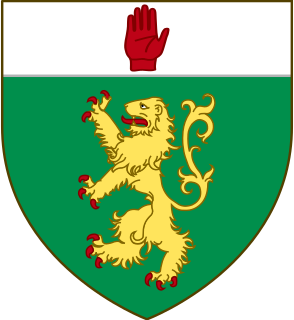 W
WMcGuinness, Guinness, McInnis, McAngus or McNeese is an Irish surname that comes from the Gaelic word Mac Angus meaning son of Angus also denoting the name Mac Naois. The family were a branch of the Ulaid, part of the Ui Echach Cobo of the Dal nAraidi, they were located in County Antrim and County Down until they pushed into northwest Ireland and Scotland during the Norman and English invasions of Ulster.Arthur Guinness (1725–1803), Irish brewer and founder Bobby McGuinness, Scottish footballer Brian McGuinness (1927–2019), British philosopher Catherine McGuinness, City of London Corporation Catherine McGuinness (judge), Irish Supreme Court judge, former senator Charles McGuinness (1893–1947), Irish adventurer, author, and sailor Deborah McGuinness, American computer scientist working in the field of artificial intelligence Ed McGuinness, American comic book artist and penciller Edwin D. McGuinness (1856–1901), American politician, mayor of Providence, Rhode Island Eugene McGuinness, British singer-songwriter Frank McGuinness, Irish playwright, translator and poet Georgina McGuinness, television journalist from Adelaide Gerry McGuinness, Scottish rugby union player John McGuinness, English professional motorcycle racer John J. McGuinness, Irish Fianna Fáil politician and TD for Carlow-Kilkenny since 1997 Mairead McGuinness, Irish Fine Gael politician and MEP since 2004 Martin McGuinness (1950–2017), Irish Sinn Féin politician and Deputy First Minister of Northern Ireland, 2007–2017 Nathan McGuinness, visual effects supervisor Nigel McGuinness, English professional wrestler Norah McGuinness (1901–1980), Irish painter and illustrator Paddy McGuinness, English comedian Paddy McGuinness, intelligence officer Padraic McGuinness (1938–2008), Australian journalist Paul McGuinness, manager of Irish rock band U2 Paul "Mad Dog" McGuinness, Irish guitarist and vocalist with the band Shane MacGowan and The Popes Rosamond McGuinness, (1929–2012), music historian Seán McGuinness, Irish Republican, TD for Leix-Offaly 1923–1925 Wilf McGuinness, English football player and manager
 W
WMcMurphy, and its variants Murphy, Morrow and MacMurrough, are anglicisations of the Irish language surname Mac Murchaidh. The clan originated in the ferns County Wexford such as Diarmaid mac Murchadha in the 17th century the clan was found in County Armagh. There are different origins than the Wexford, Cork and Fermanagh County septs.
 W
WThe McPhillips surname may be of Scottish or Irish origin, the surname is found predominantly in Ireland, in Cavan, Fermanagh and Monaghan counties.
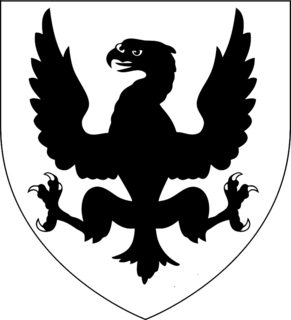 W
WThe name Moriarty is an Anglicized version of the Irish name Ó Muircheartaigh [oː ˈmˠɪɾʲɪçaɾˠt̪ˠiː] which originated in County Kerry in Ireland. Ó Muircheartaigh can be translated to mean 'navigator' or 'sea worthy', as the Irish word muir means sea and ceardach means skilled. Several prominent people have the Irish name Moriarty, mostly as a surname.
 W
WMorrow is a surname of Scottish origins.
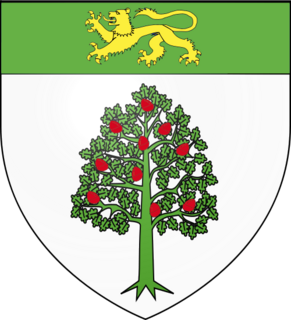 W
WMurphy is an Irish surname and the most common surname in the Republic of Ireland.
 W
WO'Driscoll is an Irish surname stemming from the Gaelic Ó hEidirsceoil clan. The O'Driscolls were rulers of the Dáirine sept of the Corcu Loígde until the early modern period. Their ancestors were Kings of Munster until the rise of the Eóganachta in the 7th century. At the start of the 13th century, three prominent branches of the family came into existence: O'Driscoll Mor, O'Driscoll Og, and O'Driscoll Beara. The Ó prefix was dropped by many in Ireland during the 17th and 18th centuries. The surname is now most prominent in the Irish counties of Cork and Kerry.
 W
WO'Keeffe, also O'Keefe, Keef, Keefe or Keeffe, is the name of an Irish Gaelic clan based most prominently in what is today County Cork, particularly around Fermoy and Duhallow. The name comes from caomh, meaning "kind" or "gentle"; some reformed spellings present it as Ó Cuív and the feminine form of the original is Ní Chaoimh. As the primary sept of the Eóganacht Glendamnach, the family were once Kings of Munster from the 6th to the 8th centuries.
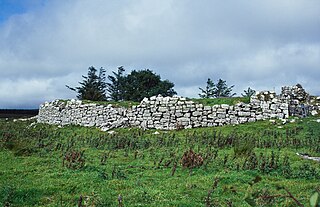 W
WThe O'Davoren family were a scholarly clan of Corcomroe, Thomond, Ireland active since medieval times.
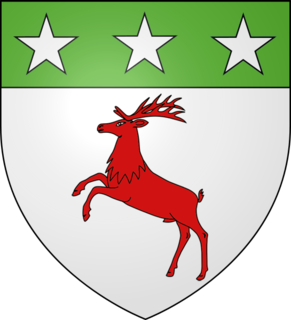 W
WThe O’Doherty family is an Irish clan based in County Donegal in the north of the island of Ireland.
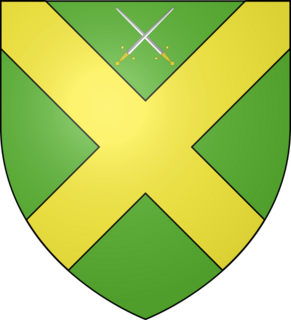 W
WO'Dowd is an Irish Gaelic clan based most prominently in what is today County Mayo and County Sligo. The clan name originated in the 9th century as a derivative of its founder Dubda mac Connmhach. They descend in the paternal line from the Connachta's Uí Fiachrach. The immediate progenitors of the O'Dowd were Kings of Connacht during the 7th and 8th centuries in the form of Dúnchad Muirisci, Indrechtach mac Dúnchado, Ailill Medraige mac Indrechtaig and Donn Cothaid mac Cathail, before losing ground to their rivals the Uí Briúin.
 W
WO'Halloran is the surname of the ultimate and at least two distinct Gaelic-Irish families, one in County Galway and another in south-east County Clare linked to the Dál gCais. On occasions it is translated as "stranger" or "from across the sea". The name states that this family were "importers" and were the lords, and dominant sept of Clan Fergail.
 W
WO'Reilly is a group of families, ultimately all of Irish Gaelic origin, who were historically the kings of East Bréifne in what is today County Cavan. The clan were part of the Connachta's Uí Briúin Bréifne kindred and were closely related to the Ó Ruairc (O'Rourkes) of West Bréifne. O'Reilly is ranked tenth in the top twenty list of most common Irish surnames. It is also the patronymic form of the Irish name Reilly. The name is commonly found throughout Ireland, with the greatest concentration of the surname found in County Cavan followed by Longford, Meath, Westmeath, Fermanagh and Monaghan, and the Province of Leinster.
 W
WO'Sullivan is an Irish Gaelic clan based most prominently in what is today County Cork and County Kerry. The surname is associated with the southwestern part of Ireland, and was originally found in County Tipperary and Kerry before the Anglo-Norman invasion. It is the third most numerous surname in Ireland. Due to emigration, it is also common in Australia, North America, Britain, and the rest of the world.
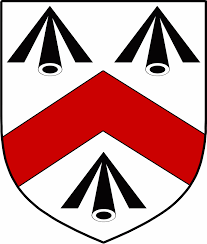 W
WWalsh is a common Irish surname, meaning "Briton" or "foreigner", literally "Welshman" or "Wales", taken to Ireland by soldiers from Britain, namely Cambro-Norman/Welsh, Cornish and Cumbrian soldiers during and after the Norman invasion of Ireland. It is most common in County Mayo and County Kilkenny. It is the fourth most common surname in Ireland, and the 265th most common in the United States. There are variants including "Walshe", “Welch”, "Welsh", "Brannagh", and the Irish "Breathnach". Walsh is uncommon as a given name. The name is often pronounced "Welsh" in the south and west of the country.
 W
WWhalan is a surname, an anglicized variant of the Gaelic surname, Ó Faoláin, see page "Phelan" for more. Notable people with this surname include:Elka Whalan, Australian swimmer Paul Whalan Thomas Whalan